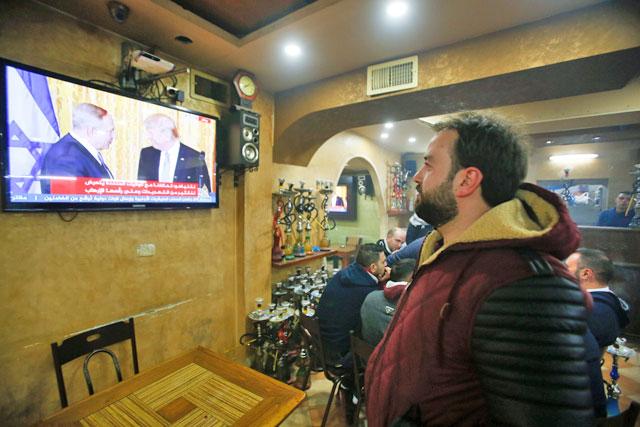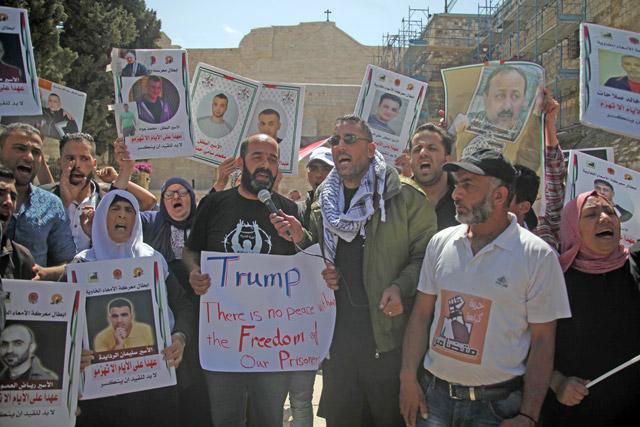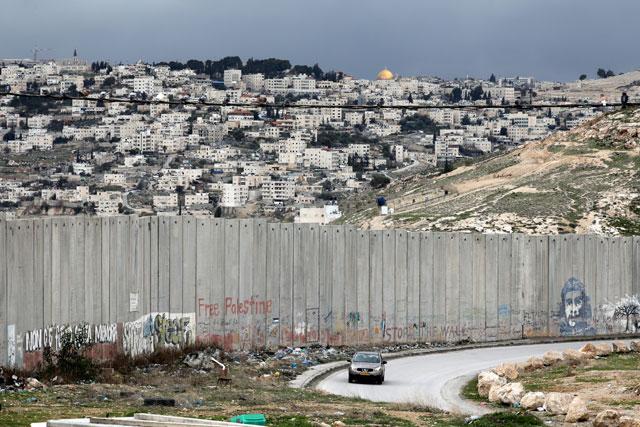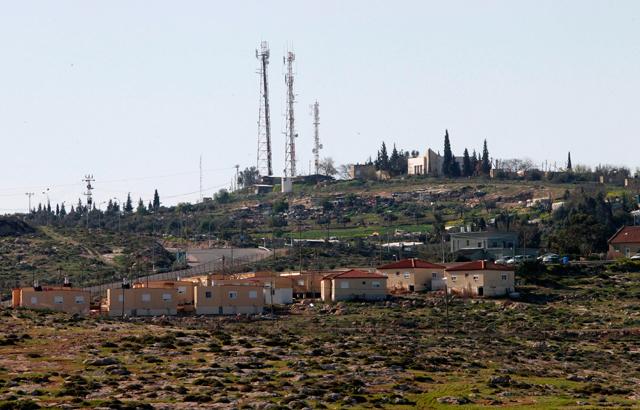You are here
Israeli joy, Palestinian alarm at Trump two-state shift
By AFP - Feb 16,2017 - Last updated at Feb 16,2017

A Palestinian man watches a joint press conference by US President Donald Trump and Israeli Prime Minister Benjamin Netanyahu, in a coffee shop in the West Bank city of Hebron on Wednesday (Reuters photo)
OCCUPIED JERUSALEM — Donald Trump’s shelving of the decades-long goal of a two-state solution to the Middle East conflict has excited Israelis and alarmed Palestinians and Arabs, but no-one is quite sure what it means.
The US president’s announcement was hailed by ministers in Israel’s right-wing government, a number of whom have called for the annexation of Palestinian territory in the occupied West Bank.
“The Palestinian flag has come down from the mast and the Israeli flag has taken its place,” far-right Education Minister Naftali Bennett said.
Science Minister Ofir Akunis hailed, “The end of a dangerous and erroneous idea: the creation of a Palestinian terrorist state in the heart of the land of Israel.”
Right-wing politicians consider the West Bank, occupied since 1967 in contravention of international law, to be part of historic Israel for religious reasons.
In the first meeting with Israeli Prime Minister Benjamin Netanyahu since his inauguration, Trump on Wednesday broke with international consensus and decades of US policy insisting on a future that included an independent Palestinian state alongside Israel.
“I’m looking at two-state and one-state, and I like the one that both parties like. I’m very happy with the one that both parties like,” Trump said. “I can live with either one.”
The two-state solution has long been the cornerstone of US and international policy, but Netanyahu has long wavered on his support for it.
It is the first time Netanayahu’s premiership has coincided with a Republican president, and Israeli media hailed Trump’s policy shift as a major success.
Michael Oren, deputy minister in Netanyahu’s office, said they could not have hoped for a better statement.
Palestinians and regional powers, however, were less impressed.
Arab League chief Ahmed Abul Gheit said no alternative to two states would be acceptable.
“The conflict”, he said, “requires a comprehensive and just peace based on a two-state solution with an independent Palestinian state.”
The Palestinians publicly tried to downplay the issue.
The foreign ministry said it was too early to talk about Israel and US perspectives aligning, while Palestinian President Mahmoud Abbas said his government was “ready to deal positively” with the White House.
Hossam Zomlot, a special adviser to Abbas, said the two-state solution was still their preferred option.
“What we retain is that Trump says he wants peace,” Zomlot said, adding Israel sought an “apartheid state”.
Trump and Abbas have never spoken and officials have quietly fretted about being frozen out.
On Tuesday, however, CIA chief Mike Pompeo held talks with Abbas in the West Bank city of Ramallah, Palestinian officials said, the most senior figure to meet with him since Trump’s inauguration.
Trump’s controversial pick for ambassador to Israel, longtime settlement supporter David Friedman, was appearing at a confirmation hearing at the Senate foreign relations committee on Thursday.
‘Weak’ position
The UN envoy for the Middle East peace process, Nickolay Mladenov, said the two-state solution remains “the only way” to meet the aspirations of the Palestinians and the Israelis.
Jihad Harb, a Palestinian political scientist, said the leadership was being cautious due to its “weak position” and its past failure to follow through on threats.
“The Palestinian leadership has failed to open a dialogue with the US administration. It is afraid that an escalation [in rhetoric] at this stage could ruin any possibility of dialogue,” he said.
The leadership, Harb added, has limited options if Trump continues to freeze them out.
Ghassan Khatib, a professor and former Palestinian official, agreed Trump was “very bad for the Palestinians”.
What a one-state solution would look like in reality remains unclear.
Oren implied there was support for what has been dubbed by Israeli media as the “state minus” approach, meaning levels of autonomy for Palestinian areas in the West Bank but never full independence.
“[It] may not conform to what we know as a two-state solution but would enable the Palestinians to lead their lives in prosperity and security,” Oren said.
Ofer Zalzberg of the International Crisis Group think tank said the Trump administration appeared to have “zero clarity” on the meaning of a one-state solution, leaving the Israelis in prime position to dictate terms.
“Essentially Netanyahu was presented with the choice between one state and two,” he said. “But he is in favour of one state and a half.”
Shmuel Rosner from the Jewish People Policy Institute agreed it was unclear what Trump meant.
“I don’t think what Trump presented yesterday was a realistic vision for Middle East peace,” he said.
Related Articles
OCCUPIED JERUSALEM — Israeli right-wingers celebrated US President Donald Trump's visit after he made no mention of the two-state solution,
WASHINGTON — President Donald Trump on Wednesday urged Israeli Prime Minister Benjamin Netanyahu to curb settlement activity but avoided any
RAMALLAH, Palestine — President Donald Trump is "serious" about solving the Israel-Palestinian conflict, Palestinian President Mahmoud Abbas



















